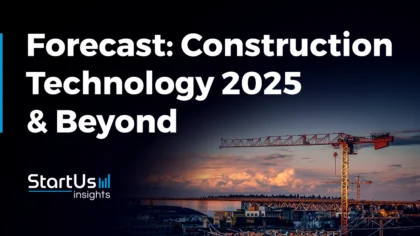Staying ahead of the technology curve means strengthening your competitive advantage. That is why we give you data-driven innovation insights into the construction industry. This time, you get to discover 5 hand-picked startups developing solutions to tackle carbon dioxide (CO2) emissions in construction.
Global Startup Heat Map: 5 Top Startups Tackling CO2 Emissions
The 5 startups you will explore below are chosen based on our data-driven startup scouting approach, taking into account factors such as location, founding year, and relevance of technology, among others. This analysis is based on the Big Data & Artificial Intelligence (AI)-powered StartUs Insights Discovery Platform, covering over 1.3 million startups & scaleups globally.
The Global Startup Heat Map below highlights the 5 startups & scaleups tackling CO2 emissions in construction our Innovation Researchers curated for this report. Moreover, you get insights into regions that observe a high startup activity and the global geographic distribution of the 171 companies we analyzed for this specific topic.
CarbiCrete works on Cement-free Concrete
Conventional construction methods and applications persist today. And concrete is one of the biggest CO2 polluters in the industry. That is why businesses and researchers develop solutions such as carbon capture and AI-powered property control to reduce carbon emissions from the production of concrete and its main component, cement. However, some technologies remove the use of cement from the concrete formula altogether.
Canadian startup CarbiCrete develops cement-free concrete technology. The startup’s carbonation activation process replaces cement with mineral waste from steel-making and curing the concrete mix with CO2. The carbon-negative technology helps manufacturers lower their carbon footprint and reduce water waste from production.
Tend offers CO2 Emission Calculations
In construction, carbon dioxide is commonly used in pressure tools and welding equipment, as well as to create dry ice pellets. However, construction activities and further building operations contribute more considerably to the high carbon emissions of the industry. Consequently, startups develop CO2 emissions estimation and reduction strategies.
Swiss startup Tend offers CO2 calculation solutions and emission reduction action plans. The startup works both with planned projects and existing properties to make building operations and property life cycles more energy efficient. Tend employs cloud-based software for emissions analysis and helps construction managers incorporate renewable energy systems into their buildings.
PRE IMPACT develops Carbon-Neutral Environments
Carbon emissions derive from many facets of the construction process, including energy, waste, materials, machinery, and transportation. Moreover, systems such as energy and cooling continue to emit CO2 over the course of the building’s life cycle. To determine and effectively tackle carbon emissions, startups develop carbon counting solutions that account for each CO2 source.
US-based startup PRE IMPACT develops emission counting and mitigation solutions. The startup takes different components of construction such as the products, materials, and machinery, land, shipping, and transportation into account. Additionally, the startup provides emission-tackling products such as offsetting and soil-top vegetation, to help construction companies develop carbon-neutral built environments.
Qi Square works on Digital Twin Simulations
Most building-related CO2 emissions come from energy consumption. However, proper building design and the use of renewable energy systems lead to a reduction of operational carbon emissions. To this avail, startups develop visualization solutions that digitally determine building energy consumption.
Singaporean startup Qi Square develops a digital twin tool for assessing energy efficiency. To do this, the startup digitizes 2D drawings and layout plans of buildings and combines them with monthly electricity bills. Additionally, the digital twin determines energy efficacy improvements, helping building managers and city planners reduce energy-related costs and carbon emissions.
SPOT Solutions offers 3D CAD-integrated Emissions Assessment
Computer-aided design (CAD) software helps architects and engineers draft designs, visualize concepts, and simulate real-world performance. The integration of carbon emission assessment tools in CAD software further allows engineers to measure and compare the carbon footprint of different materials. To help with this, startups develop carbon counting solutions that estimate the impact of building construction and operation.
Danish startup SPOT Solutions provides a carbon emissions estimation tool that integrates with 3D-CAD software. The startup’s product, ABATE, estimates the carbon footprint of a building model and its components, showing alternative solutions and their impact. The integrated solution helps architects and engineers reduce the CO2 emissions of their construction projects.
Discover more startups tackling CO2 Emissions
To keep you up-to-date on the latest technology and emerging solutions, we provide you with actionable innovation intelligence – quickly and exhaustively. You can download our free Construction Innovation Report and discover new business opportunities or save your time & let us look into your areas of interest. We provide you with an exhaustive overview of new startups, scaleups & emerging technologies that matter to you.










